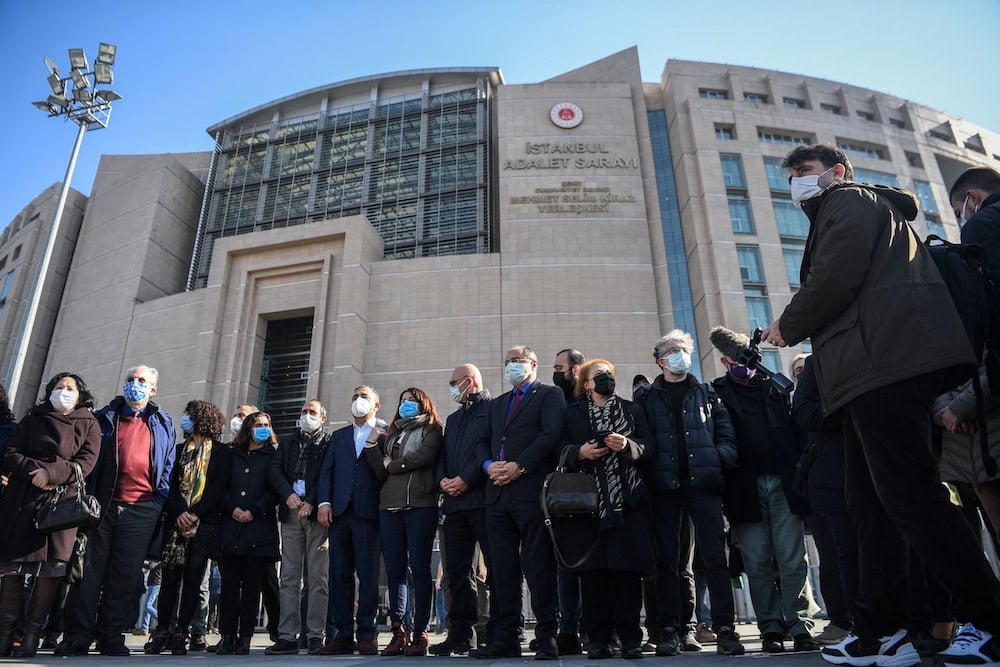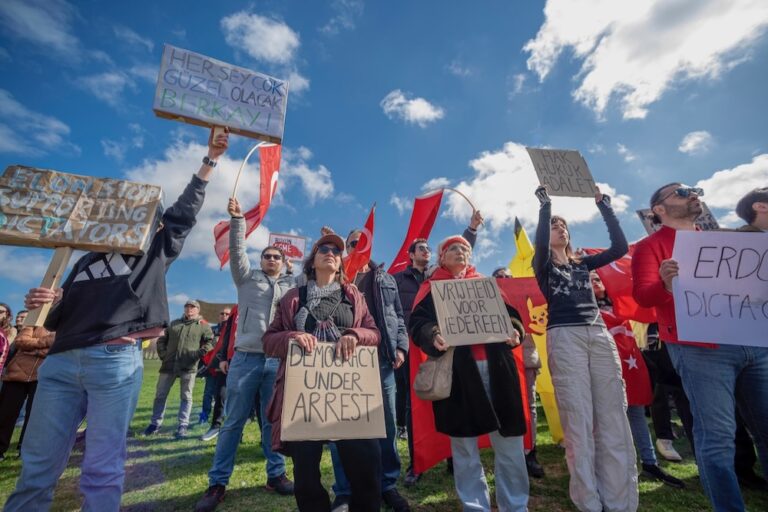The most common accusations faced by journalists on trial were 'insult' and 'terrorism' related charges.
This statement was originally published on expressioninterrupted.com
In the first quarter of 2024, at least 210 journalists and media workers stood trial in 123 court cases. Nineteen journalists were sentenced in 16 of the 37 cases that concluded during the reporting period, while at least 10 new cases were filed against journalists
The ninth of our Freedom of Expression and the Press Agenda quarterly reports has been published. Aimed at presenting an overview of the media freedom and freedom of expression environment in Turkey, our reports are based on data compiled through our trial monitoring work and research of open sources of information. The latest edition covers the first three months of 2024.
The report shows through monthly and quarterly statistics that the decrease in the number of journalists in prison in Turkey since 2023 does not indicate progress in the field of press freedom, and that there is no decrease in the number of journalists who are subject to investigations and/or trials due to their reporting, social media posts, protests they cover or their attempts to protest judicial harassment targeting their colleagues.
You can read the full report here.
210 journalists tried in 3 months, 29 journalists in prison
According to Expression Interrupted data, during the period covered by the report, 210 journalists stood trial in 123 cases overseen by courts of first instance in Turkey. In 16 of the 37 concluded cases, 19 journalists were sentenced. Among them, 15 journalists were sentenced to a total of 35 years and 115 days in prison, and four journalists were sentenced to a total of TL 43,017 in compensation and judicial fines.
During the months of January, February and March, at least 10 new court cases were filed against nine journalists and one newspaper. While at least 16 journalists were detained, new investigations were launched against 25 journalists.
Five journalists were sent to prison and 11 journalists were released in the first quarter of the year. As of the end of the period covered in the report, the number of journalists in prison in Turkey was 29. According to P24 data, this marks the lowest number on record in the list of journalists in prison, compiled by P24, since the State of Emergency (OHAL) period, which lasted from July 2016 through July 2018.
Journalist sentenced for “insulting” assailants
According to the report, during the first quarter of the year at least four journalists appeared before a court not as defendants, but as complainants over the violations they were subjected to. In two of these cases, the announcement of the sentences given to the perpetrators of physical attacks or violent police interventions against journalists were deferred, while one journalist who was a complainant in one of these cases was sentenced to prison in another case filed on the allegation that he had “insulted” the assailants.
Journalists mostly tried on “insult” and “terrorism” charges
The most common accusations faced by journalists on trial in this quarter were “insult” and “terrorism” related charges. The most common accusation against journalists was the charge of “insult,” which was used in 29 separate cases, while in 17 of these cases, journalists were charged with “insulting a public official due to their duty.” The second most frequently used accusation was “membership in a terrorist organization,” which was used in 25 separate cases, while the charge of “terrorism propaganda” was in the third spot, faced by journalists in 24 different cases. In 11 cases heard during the reporting period, journalists were charged with “insulting the president.” “Marking public officials assigned with the fight against terrorism as targets” and “violating the Law on Meetings and Demonstrations” were also among the most frequently leveled accusations against journalists during this period.
“Disinformation” cases continue to increase
During the reporting period, new court cases and investigations continued to be filed against journalists on the charge of “disseminating misleading information,” a provision added to the Turkish Penal Code in 2022. In the first quarter of the year, two new cases were filed against two journalists on this charge while four journalists were tried in three previously filed cases. Five journalists were investigated and a criminal complaint was filed against one journalist on suspicion of “spreading misleading information.”
Case filed by Evrensel rejected; no inspection for TRT
Regulatory bodies such as the Press Advertisement Institution (BİK) and the Radio and Television Supreme Council (RTÜK) also continued to serve as tools of political pressure on pro-opposition media outlets during the first three months of the year.
A case filed by Evrensel newspaper against the BİK’s decision to permanently revoke the newspaper’s right to publish public ads and announcements was rejected by an administrative court during the period covered by the report. The public advertisement embargo imposed on Yeni Asya newspaper also entered its fifth year during this period.
During the period covered in the report, there were concerns that both the partisan broadcasting policy of the TRT and RTÜK’s penalties mainly targeting pro-opposition networks would intensify ahead of the local elections to be held on 31 March 2024. İlhan Taşcı and Tuncay Keser, RTÜK members elected from the main opposition CHP quota, requested an investigation into TRT’s broadcasts on the grounds that it favored candidates of the ruling AKP and its allies in the pre-election period, which was not accepted by the Council due to a lack of quorum. In the meantime, the Council continued imposing new penalties on pro-opposition broadcasters, which are also listed in detail in our report.



